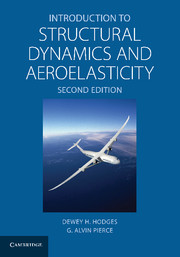5 - Aeroelastic Flutter
Published online by Cambridge University Press: 05 June 2012
Summary
The pilot of the airplane … succeeded in landing with roughly two-thirds of his horizontal tail surface out of action; some others have, unfortunately, not been so lucky. … The flutter problem is now generally accepted as a problem of primary concern in the design of current aircraft structures. Stiffness criteria based on flutter requirements are, in many instances, the critical design criteria. … There is no evidence that flutter will have any less influence on the design of aerodynamically controlled booster vehicles and re-entry gliders than it has, for instance, on manned bombers.
–R. L. Bisplinghoff and H. Ashley in Principles of Aeroelasticity, John Wiley and Sons, Inc., 1962Chapter 3 addressed the subject of structural dynamics, which is the study of phenomena associated with the interaction of inertial and elastic forces in mechanical systems. In particular, the mechanical systems considered were one-dimensional, continuous configurations that exhibit the general structural-dynamic behavior of flight vehicles. If in the analysis of these structural-dynamic systems aerodynamic loading is included, then the resulting dynamic phenomena may be classified as aeroelastic. As observed in Chapter 4, aeroelastic phenomena can have a significant influence on the design of flight vehicles. Indeed, these effects can greatly alter the design requirements that are specified for the disciplines of performance, structural loads, flight stability and control, and even propulsion. In addition, aeroelastic phenomena can introduce catastrophic instabilities of the structure that are unique to aeroelastic interactions and can limit the flight envelope.
- Type
- Chapter
- Information
- Introduction to Structural Dynamics and Aeroelasticity , pp. 175 - 230Publisher: Cambridge University PressPrint publication year: 2011
- 8
- Cited by



